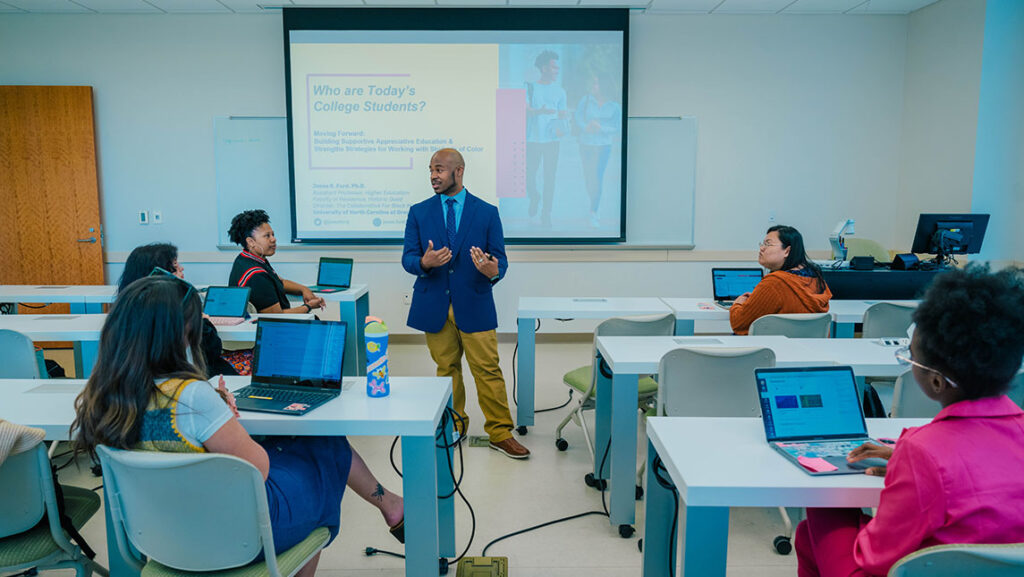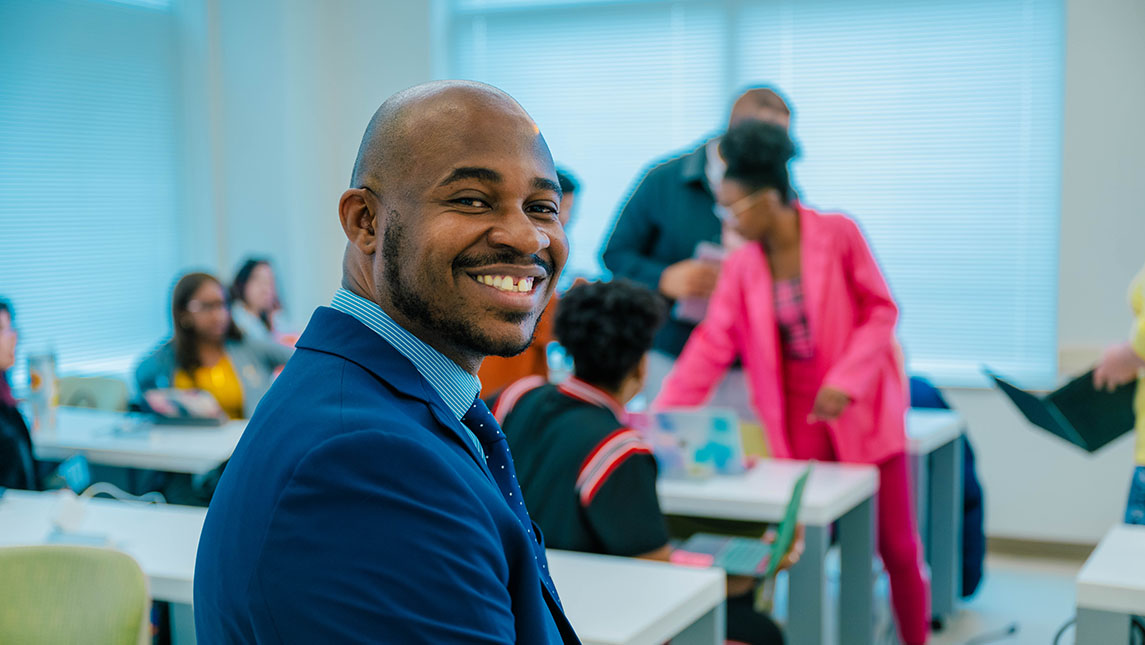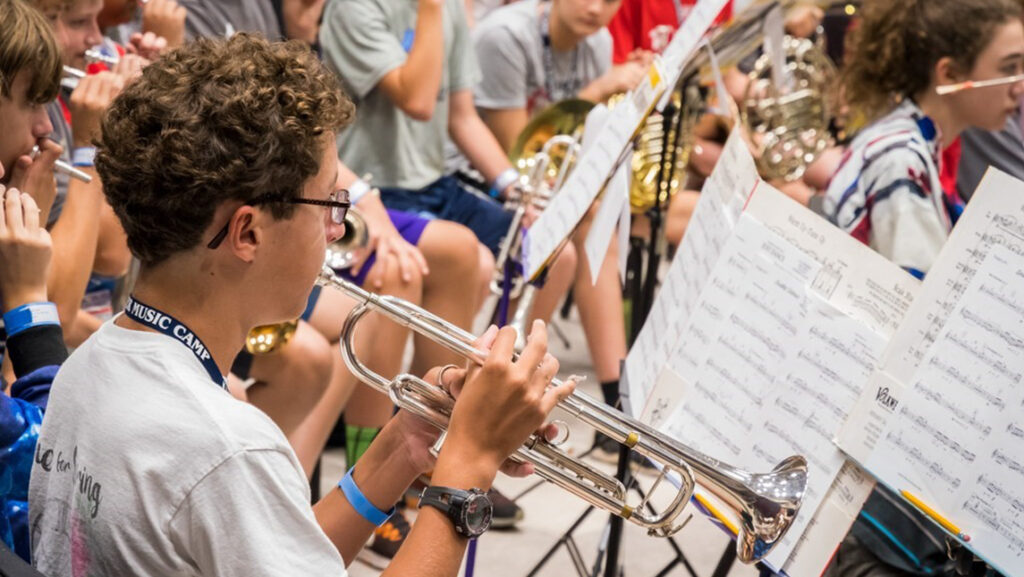UNCG Assistant Professor Jesse Ford’s efforts to better position Black men for success include a Fall 2024 undergraduate course on leadership and more.
The odds seem to be stacked against Black men in college: Just 40 percent who enroll in undergraduate programs complete their degrees within six years. But at UNC Greensboro, efforts are underway to improve those odds.
Jesse Ford, an assistant professor in the Department of Teacher Education and Higher Education, couches his work under an umbrella he calls the Collaborative for Black Men Retention and Research. It’s aimed at increasing academic success, not just at the university but for the wider male population, from pre-K through PhD.
This fall, Ford will launch a new undergraduate course aimed at helping UNCG’s Black men succeed at college and beyond. The Black Men Leadership course is designed to facilitate conversations around leadership development and leadership efficacy.
It will explore the question of how leadership education can be used, he says, “as a vessel to talk about some of the perceptions, ideologies, and realities that Black men experience in their day-to-day lives and to help them toward academic and career success.”

Space for conversation
Ford sees value in having what he calls “intentional and appreciative educational learning spaces” in higher education for facilitating conversations among people with shared identities.
Such spaces allow them to talk about how such experiences have affected how they see themselves and how they think about “moving the needle forward for their own success,” he adds.
To the course, Ford brings years of experience researching and developing retention-based programs for Black men on other university campuses.
His doctoral studies and research focused on how Black students navigate and overcome systemic challenges in education. More recently, with Cameron Beatty of Florida State, Ford co-edited the 2023 textbook “Engaging Black Men in College Through Leadership Learning.” The book centers on leadership, Black identity, and the importance of the college environment in shaping the next generation of Black men collegiate leaders.
‘We’re not far removed from pressing societal issues’
Ford says that the oppressive systemic issues facing Black men in college are like those confronting all Black Americans.
“We’re not far removed from the issues around Trayvon Martin or George Floyd or more pressing racial injustices in our country,” he says. “Our students are bringing many of those issues with them to college. And while these things may not be at the forefront on their minds, they still impact how students see and think about themselves in educational spaces.”
Because there’s no how-to guide for navigating college, Black students have had to figure out the answers themselves, often without mentors to guide them, Ford says. Even though Black people represent 13 percent of the national population, they make up just 6 percent of college and university faculty members, according to the National Center for Education Statistics.
“We naturally gravitate to those who look like us or have shared experiences or realities, and we know from research that there’s a lack of Black male professionals, as well as faculty,” Ford says. “I think that plays into how undergraduate men see the college campus and the environment.”
Speaking from experience
Ford speaks directly from his own experience.
“I’ve never had a Black man teach me in a classroom space my entire educational journey, from K through 12 through PhD,” he says. “A lot of learning and development that has happened for me has been by people who don’t look like me. I would not be where I am without them, and I remain grateful for their investment in me.”
Ford also acknowledges Black mentors who have influenced his work. For example, he points to an adviser and mentor’s work that led him to begin thinking about the experience of Black men through three frames — academic preparation, mentorship, and professional development.
That thinking helped shape Ford’s approach to a course he taught at Florida State that has evolved into the soon-to-be-offered Black Men Leadership course at UNCG.
A different course for a different community
“UNCG has some amazing professionals who are doing critical work to support Black students in their development,” he says. “So here, it’s not necessarily building community, it’s more how we take the community we already have and expand on it and how we make sure students have the tools and skills to be successful here on campus and when they leave.”
To help students with those skills, Ford intends to offer monthly programmatic support for students.
The goal will be twofold, he says: “To form community and conversations about some of these tough issues and provide a space for students to have conversations about their blackness, their maleness, and all the tough issues that go along with that, and to build skills that will help them finish their degrees.”
Through these programs and his research, Ford hopes to help inform how UNCG and other institutions can help more students succeed.
“My vision is that we’re able to shift the narrative on a population that is often seen as challenging, troubled, unengaged, and uninvested,” he says. “I want us to be able to have conversations that see Black men thrive and succeed in academic pursuits.”
Story by Dee Shore
Photography by Sean Norona, University Communications




